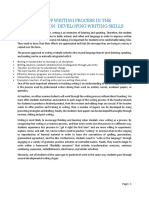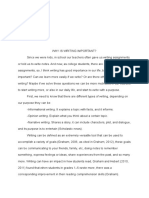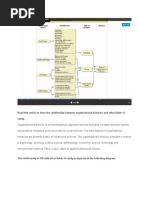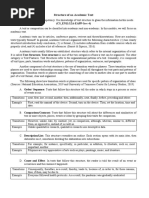Writing Processes-Final JMW
Uploaded by
api-313623377Writing Processes-Final JMW
Uploaded by
api-313623377A theory of Writing
A Theory of Writing
Joseph M. Weisenberger CPhT; CHC
English Composition 101
Arizona State University
A theory of Writing
Writing is everywhere around you. We all write in different forms. The forms vary on what the
writers intentions are or what he or she wants to create. If youre a student, you likely live in a world of
essays and papers. If youre a business man, your writing is most likely proposals and reports and or
letters. If youre a journalist youre likely spending the most of your writing in the form of articles. There
are four main types of writings, expository, persuasive, narrative and descriptive. Three forms of writing,
Expository, Persuasive, and descriptive all develop an intention otherwise known as reflection. No
matter what form of writing youre practicing, each one of them has its own guidelines and its own
importance in this highly written communicative world. What these entire writings share in common is
reflection.
Reflective writing records a writers process of thinking about what he or she is doing. Reflection
helps a writer grow beyond succeeding in a particular writing project. Most writing is reflective, where
you describe something that happened or develops a story. It gives the writer insight that leads to
further learning. With reflective writing writers can adapt to a variety of purposes, audiences and
contexts, it is important as writers learn to compose, a variety of texts for different purposes and
habitats. The most important function of reflective writing is to establish a habit of self-reflective
thinking within the writer. Like John Getty describes an American-Born Philanthropist and book
collector. Describes rhetoric as the act of speaking in such a manner, as to obtain the end for which we
speak. Rhetoric is important if you want people to do certain things, to use language thoughtfully, to
get them to do those things, or to understand things better. I use Rhetoric in my writings, by using
statement phrases that explains to the reader what my point is and understand my reasoning behind it.
The first time that I had to perform reflective writing myself was in the spring of 2016. It did feel
like a conduct at first. I was a first year English class at Arizona State University. Sure we were taught
about how to write essays, or letters. But we werent taught on How to write. In high school we werent
A theory of Writing
taught about the theory of writing, we werent taught about reflective writing or the habits of mind
when it came to writing. We were only taught how to structure sentences and later paragraphs. We
were taught how to research via the web. Outside of that we really werent taught about how to write.
It wasnt until I started taking this class that I learned the processes of writing. In Dr. Pacton class I,
learned the concepts of writing from rhetorical knowledge and how to write in an audiences point of
view. I learned how to read and analyze data in the form of an essay. I have learned how to write about
myself, something that I have always hated doing. I began thinking critically in making decisions about
what to write about and not write about and what researching methods to use. We also learned the
various components to the writing processes and using digital technology within our writing. Dr. Pacton
taught me the benefits of using habits of mind within my writing. In class on top of each writing
assignment, we had to write several journal entries which led us through the various elements of the
writing process. On top of the writing assignments we had to publish an e-portfolio of all of our writing
adventures.
My last assignment was a miscommunicated attempt at a good student giving the teacher what
he wants. Our assignment was to write an ethnography. To write this sort of paper it was required to
conduct some research within a community of choice. I decided to determine the health and lifestyle of
my friends and family, those that I am closest too. To conduct my research I developed a survey for this
community. Within the writing process I confused the rubric, with what I actually wrote. I had way too
much internet research that my paper consisted of too many statistics of a continuing problem. I was
not writing myself into the research that I completed nor was I incorporating my personal experiences
within my ethnography. I realized this after my completing my rough draft and my peer reviewers asked
that I write myself into this community, they wanted to see a personal story. I may have disagreed with
them, but I wanted to show myself responsive and taking advice about my writing from other writers.
After my revisions I did a better job later more personal, more honest before turning in the final draft.
A theory of Writing
After Dr. Pactons class, I hope to use reflection and began developing ways of using it in all of my future
writings. Reflection helps the writer develop his or her intentions determine the relation within your
audience. Uncover problems with writing processes, set goals for revision, and make decisions about
language and style. It provides the writer and reader to develop more insight into and control over
composing and revision.
Despite reflection within writing, one should also consider, the Habits of Mind refers to
several ways of approaching the learning process that will support students success in a variety careers
and studies. There are eight core habits that are essential in your career, as well as writing.
Curiosity- the desire to know more about the world
Openness- the willingness to consider new ways of being and thinking in the world
Engagement- a sense of investment and involvement in learning
Creativity- the ability to use novel approaches for generating, investigating, and
representing ideas
Responsibility- the ability to take ownership of ones actions and understand the
consequences of those actions for ones self and others
Flexibility- the ability to adapt to situations, expectations, or demands
Metacognition- the ability to reflect on ones own thinking as well as on the individual
and cultural processes used to structure knowledge.
Source:(Framework for Success in Post-Secondary Writing. N.p.: Council of Writing
Programs Administrators, n.d. PDF.)
The most important piece to consider when thinking about the Habits of Mind, and its
relationship to writing, is creativity, and critical thinking. As writers are asked to take risks, develop
research, explore questions, topics and ideas but also use methods that are new to the writer.
Represent what was learned in new ways and evaluate the effects and consequences of their own
A theory of Writing
creative choices. Thinking critically is involved in all aspects of writing a paper. By thinking critically the
writer realizes his or her intentions in piece of writing. A sense of audience and purpose and of what the
writer wants the essay to do, is essential to a good piece of communicative writing. Critical thinking
usually requires conducting research in more ways than one. Research can be done in a variety of
methods from online to conducting an interview. It is important to know details of a topic in a broad
range rather than only knowing the basics of a topic. Beginning an essay, with a personal story it often
helps to establish the writers relationship to the text and draws the reader into your writing. It also
helps ease the writer into more complex research. Once you start writing productively they produce a
much better chance of developing expertise and working more successfully in future writing situations.
Readers are engaged by clear, expressive writing and directed by critical thinking produces a movement
of ideas that give the essay more depth and meaning.
How will my own Writing Develop
As humans we are constantly learning, its what makes us who we are. One thing though that I
think grows overtime is our writing and our writing habits. Every one of us has a different style of writing
and that style can change the readers intentions of a piece. We learn to write by reading and evaluating
our own writing. But also reading other peoples writings, we start to develop the writers intentions
within that piece. We start to ponder, what the author is doing to create this mood, to develop this
character, create this tension, or set up a plot twist. We start to evaluate the writers intention whether
it is right or wrong, and by learning from their creativity, we learn how to use creativity better within our
own writing. Learning to write is not about memorizing a set of rules, its about mastering a technique.
Writing comes with revision and not creation. Learning to write is literally a lifelong process and one that
is constantly evolving.
A theory of Writing
Works Cited
Basbender, Gita. Volume 2. Readings on Writing. N.p.: Writing Spaces, 2011. PDF.
Framework for Success in Post-Secondary Writing. N.p.: Council of Writing Programs
Administrators, n.d. PDF.
Giles, Sandra L. Volume 1. Reflective Writing and the Revision Process: What Were You
Thinking? N.p.: Writing Spaces, 2010. PDF.
Basbender, Gita. Volume 2. Critical Thinking in College Writing: From the Personal to the
Academic. N.p.: Writing Spaces, 2011. PDF
You might also like
- Writing Your Dissertation in Fifteen Minutes a Day: A Guide to Starting, Revising, and Finishing Your Doctoral ThesisFrom EverandWriting Your Dissertation in Fifteen Minutes a Day: A Guide to Starting, Revising, and Finishing Your Doctoral Thesis3.5/5 (66)
- Supplementary Material For Argumentative WritingNo ratings yetSupplementary Material For Argumentative Writing36 pages
- Writing without Hurry: A Mindful Meditative Approach to Journal Writing and Personal TransformationFrom EverandWriting without Hurry: A Mindful Meditative Approach to Journal Writing and Personal Transformation5/5 (1)
- How To Write Charles King 1999 Georgetown UniversityNo ratings yetHow To Write Charles King 1999 Georgetown University4 pages
- Thinking On The Page: A College Student's Guide to Effective WritingFrom EverandThinking On The Page: A College Student's Guide to Effective WritingNo ratings yet
- Writing for Busy Readers: Communicate More Effectively in the Real WorldFrom EverandWriting for Busy Readers: Communicate More Effectively in the Real World4/5 (12)
- Writing for Understanding: Using Backwards Design to Help All Students Write EffectivelyFrom EverandWriting for Understanding: Using Backwards Design to Help All Students Write EffectivelyNo ratings yet
- 04-12-2021 Begs138 Writing and Speaking Skills Ignou ClassesNo ratings yet04-12-2021 Begs138 Writing and Speaking Skills Ignou Classes57 pages
- Theory of Writing Worksheet: Eight Habits of MindNo ratings yetTheory of Writing Worksheet: Eight Habits of Mind3 pages
- WC - Quiz 3. Develop Effective Writing Habits - wc.2021No ratings yetWC - Quiz 3. Develop Effective Writing Habits - wc.20218 pages
- Learn Best, How Others Learn Best, and Implications For My Future Learning and EducationNo ratings yetLearn Best, How Others Learn Best, and Implications For My Future Learning and Education3 pages
- A Social-Constructionist Approach To The Teaching of WritingNo ratings yetA Social-Constructionist Approach To The Teaching of Writing34 pages
- The Nature of Writing Process in The English LessonNo ratings yetThe Nature of Writing Process in The English Lesson26 pages
- Writing in An Appropriate Style - Edition 3: First Person/Third PersonNo ratings yetWriting in An Appropriate Style - Edition 3: First Person/Third Person30 pages
- Person-Centered/Client-Centered: Discovering the Self That One Truly IsFrom EverandPerson-Centered/Client-Centered: Discovering the Self That One Truly IsNo ratings yet
- Teach Writing with Growth Mindset: Classroom-Ready Resources to Support Creative Thinking, Improve Self-Talk, and Empower Skilled, Confident WritersFrom EverandTeach Writing with Growth Mindset: Classroom-Ready Resources to Support Creative Thinking, Improve Self-Talk, and Empower Skilled, Confident WritersNo ratings yet
- E427 Writing 4 Major, Second Semester 2023-2024No ratings yetE427 Writing 4 Major, Second Semester 2023-2024240 pages
- Report Writng - On Observation of Co-Curricular & Extracurricular Activities100% (4)Report Writng - On Observation of Co-Curricular & Extracurricular Activities10 pages
- How To Write A Concluding Paragraph For A Literature ReviewNo ratings yetHow To Write A Concluding Paragraph For A Literature Review5 pages
- Constitutional Law II 2020 Departmental Exam InstructionsNo ratings yetConstitutional Law II 2020 Departmental Exam Instructions1 page
- SO207 Assignment 1 - Essay Topic Questions DUE WEEK 6 FRIDAY 23 SEPTEMBER, 2022No ratings yetSO207 Assignment 1 - Essay Topic Questions DUE WEEK 6 FRIDAY 23 SEPTEMBER, 20224 pages
- Topic Outline: - Transcribed By: Etcobanez, Hannah R. - Prof. Miles de Leon - 11 - RutherfordNo ratings yetTopic Outline: - Transcribed By: Etcobanez, Hannah R. - Prof. Miles de Leon - 11 - Rutherford5 pages
- A Brief Historical Survey of Creative Non-Fiction inNo ratings yetA Brief Historical Survey of Creative Non-Fiction in12 pages
- June 12 Final Version of Completed Book PDFNo ratings yetJune 12 Final Version of Completed Book PDF141 pages
- Research Paper Topic Sentence and Thesis Statement Examples100% (2)Research Paper Topic Sentence and Thesis Statement Examples7 pages
- Advance Academic Reading and Writing NotesNo ratings yetAdvance Academic Reading and Writing Notes10 pages
- Writing Your Dissertation in Fifteen Minutes a Day: A Guide to Starting, Revising, and Finishing Your Doctoral ThesisFrom EverandWriting Your Dissertation in Fifteen Minutes a Day: A Guide to Starting, Revising, and Finishing Your Doctoral Thesis
- High-Value Writing: Real Strategies for Real-World WritingFrom EverandHigh-Value Writing: Real Strategies for Real-World Writing
- Creative Writing Workshop: Ignite Your ImaginationFrom EverandCreative Writing Workshop: Ignite Your Imagination
- Writing without Hurry: A Mindful Meditative Approach to Journal Writing and Personal TransformationFrom EverandWriting without Hurry: A Mindful Meditative Approach to Journal Writing and Personal Transformation
- Words That Work: The Essential Business Writing GuideFrom EverandWords That Work: The Essential Business Writing Guide
- How To Write Charles King 1999 Georgetown UniversityHow To Write Charles King 1999 Georgetown University
- Thinking On The Page: A College Student's Guide to Effective WritingFrom EverandThinking On The Page: A College Student's Guide to Effective Writing
- Writing for Busy Readers: Communicate More Effectively in the Real WorldFrom EverandWriting for Busy Readers: Communicate More Effectively in the Real World
- How to Think Like a Writer: Small Steps Guides, #4From EverandHow to Think Like a Writer: Small Steps Guides, #4
- Writing for Understanding: Using Backwards Design to Help All Students Write EffectivelyFrom EverandWriting for Understanding: Using Backwards Design to Help All Students Write Effectively
- 04-12-2021 Begs138 Writing and Speaking Skills Ignou Classes04-12-2021 Begs138 Writing and Speaking Skills Ignou Classes
- WC - Quiz 3. Develop Effective Writing Habits - wc.2021WC - Quiz 3. Develop Effective Writing Habits - wc.2021
- Learn Best, How Others Learn Best, and Implications For My Future Learning and EducationLearn Best, How Others Learn Best, and Implications For My Future Learning and Education
- A Social-Constructionist Approach To The Teaching of WritingA Social-Constructionist Approach To The Teaching of Writing
- The Nature of Writing Process in The English LessonThe Nature of Writing Process in The English Lesson
- Writing in An Appropriate Style - Edition 3: First Person/Third PersonWriting in An Appropriate Style - Edition 3: First Person/Third Person
- Person-Centered/Client-Centered: Discovering the Self That One Truly IsFrom EverandPerson-Centered/Client-Centered: Discovering the Self That One Truly Is
- Teach Writing with Growth Mindset: Classroom-Ready Resources to Support Creative Thinking, Improve Self-Talk, and Empower Skilled, Confident WritersFrom EverandTeach Writing with Growth Mindset: Classroom-Ready Resources to Support Creative Thinking, Improve Self-Talk, and Empower Skilled, Confident Writers
- A+ Guide to Literature Reviews: A+ Guides to Writing, #3From EverandA+ Guide to Literature Reviews: A+ Guides to Writing, #3
- Say Something!: Writing Essays that Make the GradeFrom EverandSay Something!: Writing Essays that Make the Grade
- Gale Researcher Guide for: The Writing ProcessFrom EverandGale Researcher Guide for: The Writing Process
- My Life as an Armadillo: Essays on Workshopping and WritingFrom EverandMy Life as an Armadillo: Essays on Workshopping and Writing
- Report Writng - On Observation of Co-Curricular & Extracurricular ActivitiesReport Writng - On Observation of Co-Curricular & Extracurricular Activities
- How To Write A Concluding Paragraph For A Literature ReviewHow To Write A Concluding Paragraph For A Literature Review
- Constitutional Law II 2020 Departmental Exam InstructionsConstitutional Law II 2020 Departmental Exam Instructions
- SO207 Assignment 1 - Essay Topic Questions DUE WEEK 6 FRIDAY 23 SEPTEMBER, 2022SO207 Assignment 1 - Essay Topic Questions DUE WEEK 6 FRIDAY 23 SEPTEMBER, 2022
- Topic Outline: - Transcribed By: Etcobanez, Hannah R. - Prof. Miles de Leon - 11 - RutherfordTopic Outline: - Transcribed By: Etcobanez, Hannah R. - Prof. Miles de Leon - 11 - Rutherford
- A Brief Historical Survey of Creative Non-Fiction inA Brief Historical Survey of Creative Non-Fiction in
- Research Paper Topic Sentence and Thesis Statement ExamplesResearch Paper Topic Sentence and Thesis Statement Examples

























































































